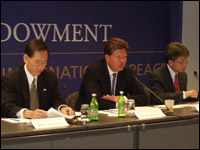Registration
You will receive an email confirming your registration.
IMGXYZ717IMGZYX On June 18, 2007, the Carnegie Endowment for International Peace hosted a talk entitled “Riding the Dragon: Hong Kong’s Economic Developments since 1997” with Bernard Chan (President of Asia Financial Group and Asia Insurance) and Stephen Cheung (Professor and chair of the Department of Economics and Finance, City University of Hong Kong); Carnegie Endowment’s Vice President for Studies, Mark Medish, moderated the event. C.Y. Leung (Convenor of the non-official members of the Executive Council of the Hong Kong Special Administrative Region) joined for the Q&A period.
Stephen Cheung spoke about the latest economic developments in Hong Kong and how it will forge ahead in the future to assert its status as one of the leading financial centers in the world. This year, 2007, marks the ten-year anniversary of Hong Kong’s return to Chinese sovereignty. Hong Kong’s economy has experienced some difficulties in the past decade, such as an economic downturn during the SARS epidemic. But the economic rebounded in 2004, partly because of the impressive economic growth of the Chinese mainland. Hong Kong has been the gateway to China since China first opened up in the late 1970s. Trade arrangements such as CEPA have facilitated the flow of goods across the border, benefiting the economies of both China and Hong Kong. This is also the case in terms of financial services; Hong Kong is well positioned to perform financial services in the mainland, such as engaging in the Chinese securities market or allowing Chinese companies to list on the Hong Kong stock market. Hong Kong should strive to capitalize on China’s economic growth in order to stay ahead of the game.
Bernard Chan focused his comments on the many changes that have occurred in the past ten years in Hong Kong. For example, the border between Mainland China and Hong Kong is one of the busiest in the world, with 3,000 crossing the border everyday. Many Chinese are going to Hong Kong as tourists; many Hong Kong residents work and invest in the mainland. This has not come without its problems. Hong Kong gets 70 percent of its food from the mainland, which brings up concerns about food safety. Many jobs have moved across the border, raising fears of decreasing employment opportunities in Hong Kong. Also, Hong Kong is facing problems of environmental degradation due to the industrialization of Guangdong province. Furthermore, the welfare system gives people incentive to remain in Hong Kong even as their opportunities decline. In addition, it is difficult for skilled Chinese workers to go to Hong Kong to work. Chan thinks that the process of integration is underway, and people need to adapt to the changes. Chan comments that it seems that the image of the government role in Hong Kong is changing, with many citizens believing the government should take a more interventionist, active role in securing the well being of its citizens given these changes. However, many of the changes feared about what would happen when Hong Kong was given back to the mainland did not occur.
C.Y. Leung, one of the key architects of the Basic Law, joined the panel for the Q & A period. He posed the question, how was everyone so incorrect in 1997 in their predictions about the future of Hong Kong, a society that is so transparent or open? Perhaps our current predictions are wrong as well? In the Q&A period, Chan addressed the first question about what specific measures Hong Kong is taking to maintain its young talent. According to Chan, Hong Kong’s special relationship with China as well as its developed economy and high quality of life are draws for young talent. In response to questions about political liberties in Hong Kong under Chinese sovereignty, Leung articulated that the people of Hong Kong have more democratic rights than they did before 1997, and all of their freedoms are intact. The panelists all agreed that increased immigration from mainland China was not a problem, and those that have chosen to move to Hong Kong have contributed to the Hong Kong economy. Lastly, Leung commented that the systems in place for collaboration between Hong Kong and China are inadequate, but they have only been developing for ten years and will probably improve in the future.
This summary was prepared by Oriana Skylar Mastro, Junior Fellow in the China Program.
